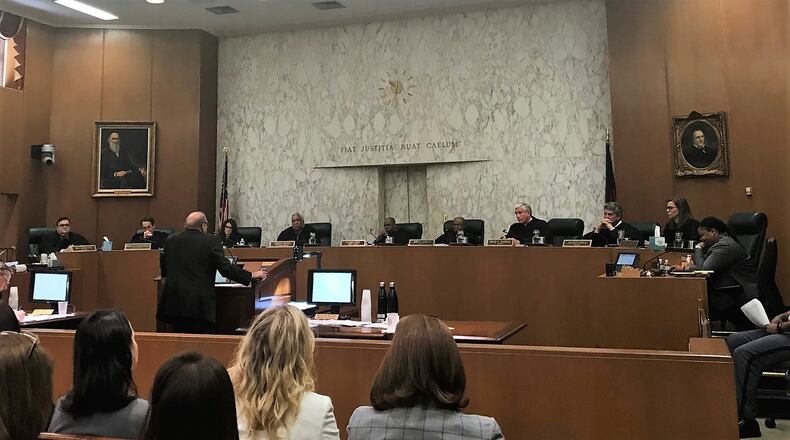DeKalb County Recorder's Court became so dysfunctional, officials say, that the General Assembly dissolved it in 2015.But not before the court's errors turned Bobby Schroeder III's life upside down.
When he was issued a traffic ticket in 2013, he went to Recorder’s Court and paid the fine, he said. But the court reported to the state Department of Driver Services that he didn’t show up. Twice, he’s been arrested. His driving privileges were suspended. The mistake led to time in custody and cost him his job, Schroeder said.
Monday, an attorney for Schroeder argued in Georgia’s Supreme Court that his client should be allowed to continue with a lawsuit against Nelly Withers, then chief judge of the Recorder’s Court, and Troy Thompson, court administrator, because they were negligent, failed to perform their duties and violated his constitutional rights.
A lower court initially threw out Schroeder’s case on the grounds that Withers and Thompson had immunity from prosecution because they were doing their jobs and were, therefore, protected from certain legal actions.
The Court of Appeals later reversed most of that court's decision, but Thompson and Withers had appealed to the Supreme Court of Georgia. Oral arguments were held Monday morning.
Harlan Miller, an attorney for Schroeder, argued that the immunity claims by Thompson and Withers are invalid and the case should be allowed to go to trial. He said his client could never conduct discovery to pinpoint how the errors occurred and if there is evidence of a pattern of negligence.
“This court was a creature of DeKalb County, and DeKalb County provided the funding,” Miller said. “And I don’t know what kind of rules, regulations, conditions, or requirements may have been established by DeKalb County, and I won’t know until we are able to do some discovery in the case.”
Attorneys for Withers and Thompson argued that their clients were performing their normal duties and are protected by immunity clauses in state and federal law. They also said that Schroeder had failed to highlight specific incidents prior to his arrest that demonstrated widespread unconstitutional practices at the traffic court.
The nine judges that heard the case included three that were added to the panel to take the place of justices who recused themselves. Chief Justice Harris Hines, Justice Carol Hunstein and Justice Nels Peterson were not required to publicly state why they stepped aside, but a spokeswoman for the Supreme Court said this sometimes occurs when justices have prior involvement in a case.
They were replaced by judges from the Court of Appeals of Georgia: Chief Judge Stephen Louis Dillard, Judge Clyde Reese and Judge Amanda Mercier.
It will likely take several months before a ruling is issued.
The Recorder's Court faced years of scrutiny before it was dissolved, including accusations that sentences and fines were passed down that exceeded limits in state law. The court also placed on probation or jailed people who didn't have the money to pay traffic fines. The county eventually settled a lawsuit filed by the American Civil Liberties Union that complained about that practice.
In 2012, a grand jury indicted three former court employees accused of masterminding and profiting from a traffic ticket-fixing scheme.
About the Author
Keep Reading
The Latest
Featured




